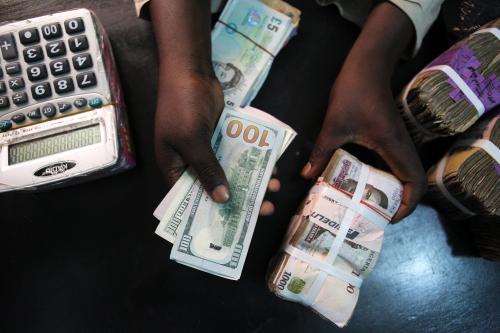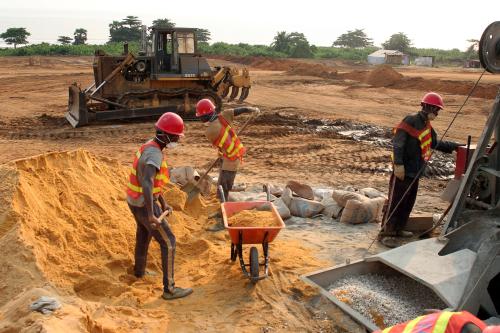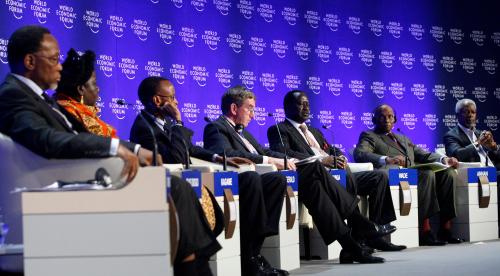Proposed change in East African pipeline route is crux of Kenya and Uganda discussions
Issues surrounding the route of an East African oil pipeline remain unresolved despite Monday’s meeting between the Kenyan and Ugandan heads of state.
After the discovery of nearly 1.7 billion barrels of recoverable oil reserves in Uganda’s Lake Albert Basin nine years ago, Uganda signed a deal in February 2014 with three international oil firms—France’s Total SA, the UK’s Tullow, and China’s CNOOC—to build an oil refinery and a pipeline for exporting the oil via port on the Indian Ocean. Last year, Kenya and Uganda agreed upon broader plans for the pipeline’s route, proposing to direct the conduit through Kenya’s Lake Turkana oilfields and ultimately to a port in Lamu, Kenya. The port in Lamu is currently under construction and comprises part of the $26 billion Lamu Port Southern Sudan-Ethiopia Transport (LAPSSET) project—a trade corridor intended to be operational in 2018 when Uganda intends to begin exporting oil.
More recently, however, Uganda has called to reroute the pipeline through Tanzania’s port of Tanga, stating that research performed by the international oil companies shows that the Tanzanian route is cheaper: Only $4 billion compared to $4.5 billion for the Kenyan route. The studies also suggest that the construction of a pipeline through Kenya would likely encounter delays due to tricky land compensation battles as well as security issues from attacks by al-Shabaab. Tanzanian President John Magufuli has enthusiastically and publically supported Uganda’s new proposition to route the pipeline through Tanzania. While this week’s meeting between the Kenya’s President Uhuru Kenyatta and Uganda’s President Yoweri Museveni was meant to bring some clarity to the final pipeline route, the two leaders agreed defer the decision and reconvene in two weeks so that their officials could have a chance to “harmonize” their views.
Central Bank of Nigeria increases benchmark interest rate
On Tuesday, Nigeria’s central bank increased its benchmark lending rate to 12 percent from 11 percent. The rate hike comes just four months after the bank reduced the rate by 2 percent in an attempt to help boost its ailing economy. In light of this week’s rate increase, some analysts claim that the November reduction was premature. Others argue that the central bank’s latest decision reflects a shift in focus from promoting economic growth to managing inflation, which has spiked to 11.4 percent—its highest rate in over three years. The central bank hopes that by establishing a higher interest rate it will reduce the amount of cash available to consumers, thus potentially reigning in inflation.
In other Nigeria news, the House of Representatives and the Senate passed the 2016 budget on Wednesday after months of political quarreling. Amid falling oil prices and declining oil revenues (which make up two-thirds of government funding), the budget proposed by President Muhammadu Buhari in December was reduced slightly from N6.08 trillion ($30.6 billion to N6.06 trillion ($30.5 billion) in its final form. Despite the amendment to reduce the budget, some experts still argue that the budget is too high and that financing government spending and managing the $15 billion deficit will be a major task for Buhari’s administration.
President Jacob Zuma’s relationship with Gupta family is to be examined by South Africa’s graft ombudsman
On Tuesday, South Africa’s Public Protector Thuli Madonsela announced plans to look into whether Zuma’s relationship with the wealthy and influential Gupta family might have breached the Executive Members Act. While Zuma has vehemently denied the accusations and the ruling African National Congress (ANC) Secretary-General Gwede Mantashe has noted that the party has thrown its “full confidence” behind the president, at the same time the party has also pledged its own investigation. Mmusi Maimane, the leader of the main opposition party, the Democratic Alliance, has called for Zuma to resign or be sacked.
These investigations come a week after Deputy Finance Minister Mcebesi Jonas announced that, in December, the Gupta family offered him the post of finance minister while the position was still occupied by Nhlanhla Nene. Another ANC politician, Vytjie Mentor, has since reported that she had similarly been offered the position of minister of public enterprises in 2010. These incidents are not the first time the Guptas, who have a business relationship with Zuma’s son, have been accused of receiving special and inappropriate privileges from the government: For example, in 2013, 200 guests of the Guptas’ were allowed to land at a military air base for a wedding on a privately chartered jet.
These allegations come at a time of economic challenges for the country. After the abrupt dismissal of Nene in December followed by the four-day tenure of a little-known policymaker (both moves that sent South African markets reeling), former and now-current Finance Minister Pravin Gordhan faces nervous investors and a declining rand. At the same time, South Africa also faces a potential downgrading of its credit to junk—a fear and possibility heightened by this political commotion.






Commentary
Africa in the news: Kenya and Uganda discuss oil pipeline route, Nigeria’s Central Bank raises interest rate, and South Africa’s Zuma faces Gupta probe
March 25, 2016